The Philippines Holds the 3rd Philippine Nuclear Congress
- Details
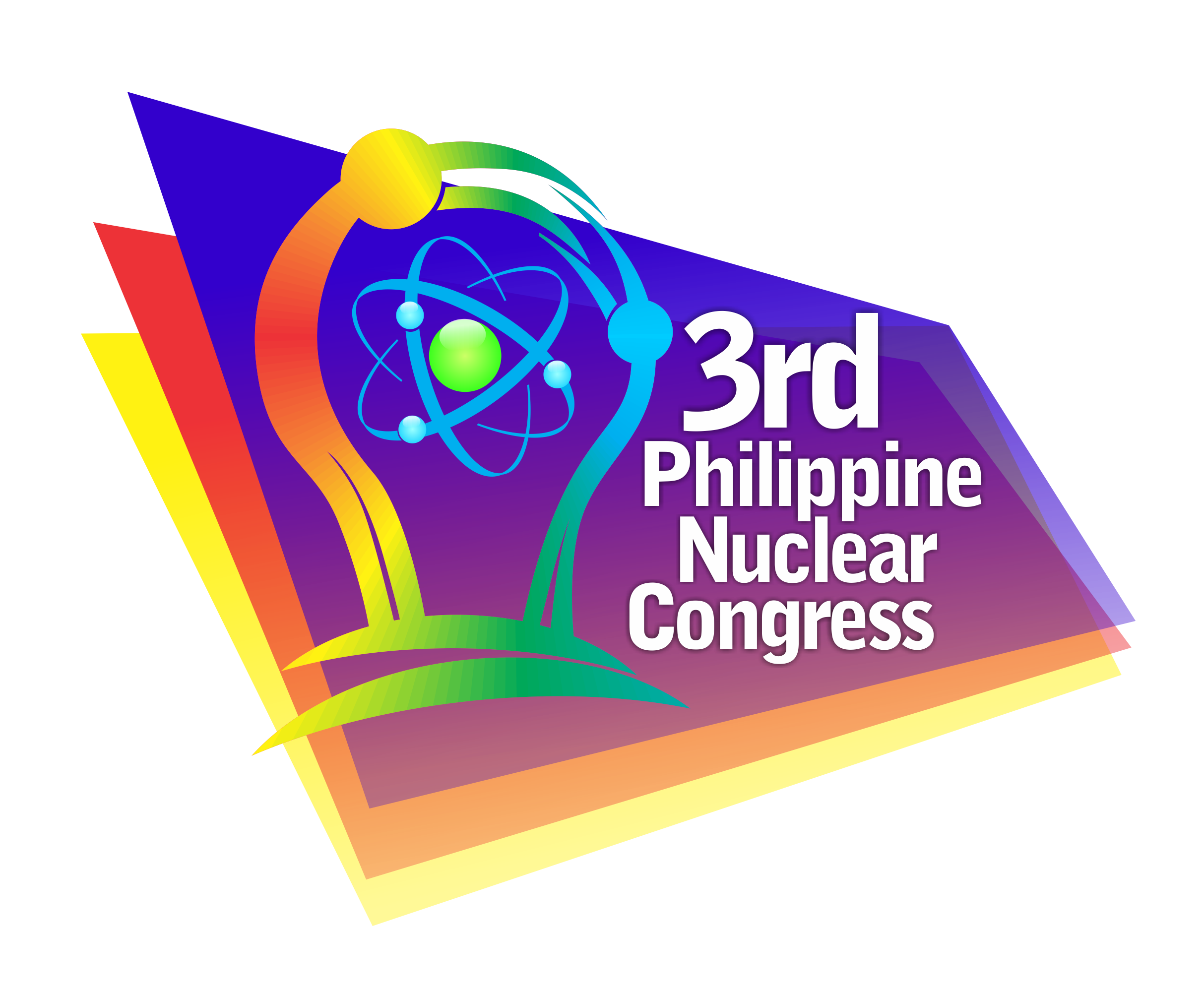
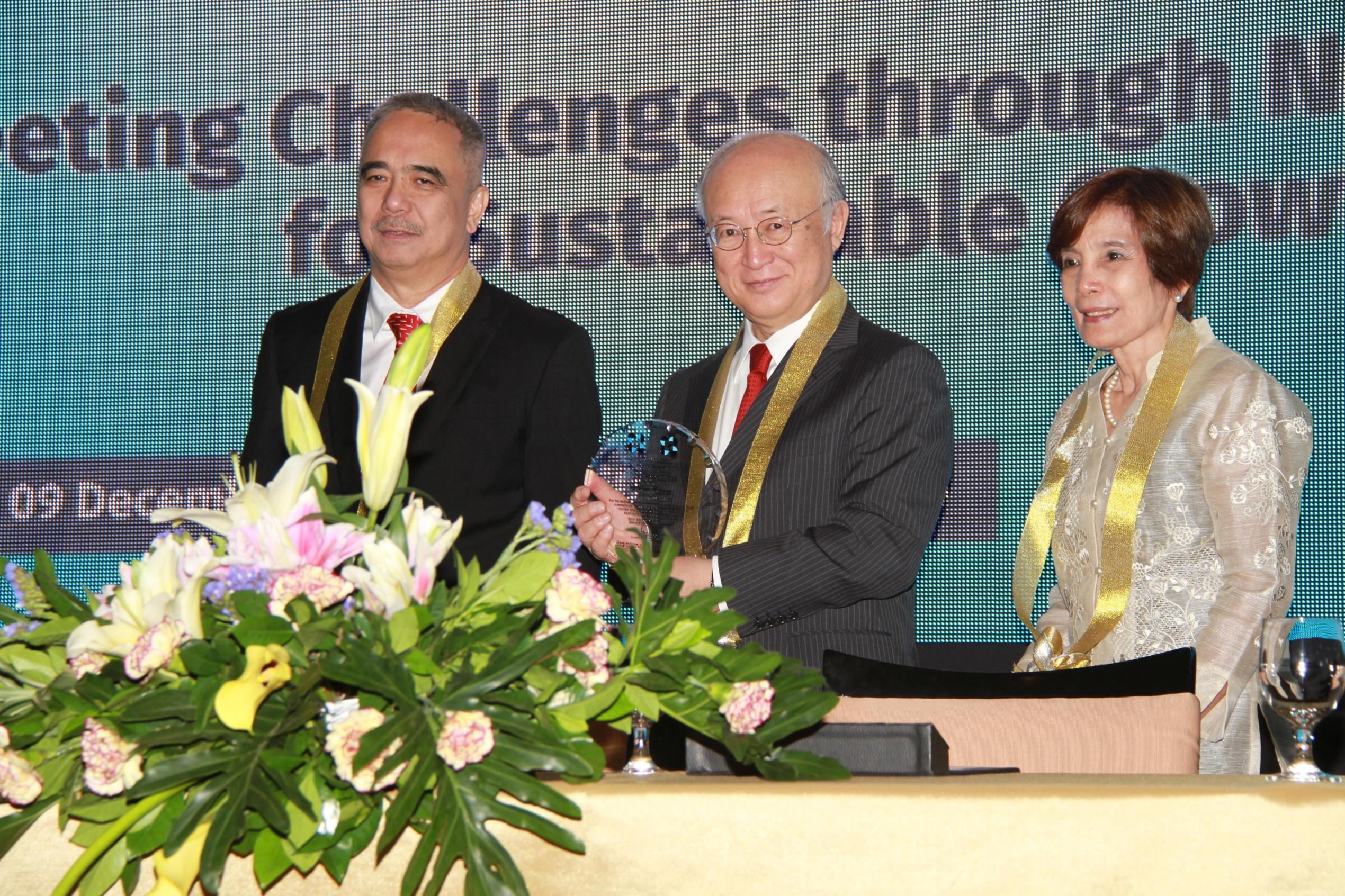
International Atomic Energy Agency Director General Yukiya Amano (center) with DOST Secretary Mario Montejo (left) and PNRI Director Dr. Alumanda Dela Rosa (right) during the opening ceremonies of the 3rd Philippine Nuclear Congress at the Diamond Hotel in Manila
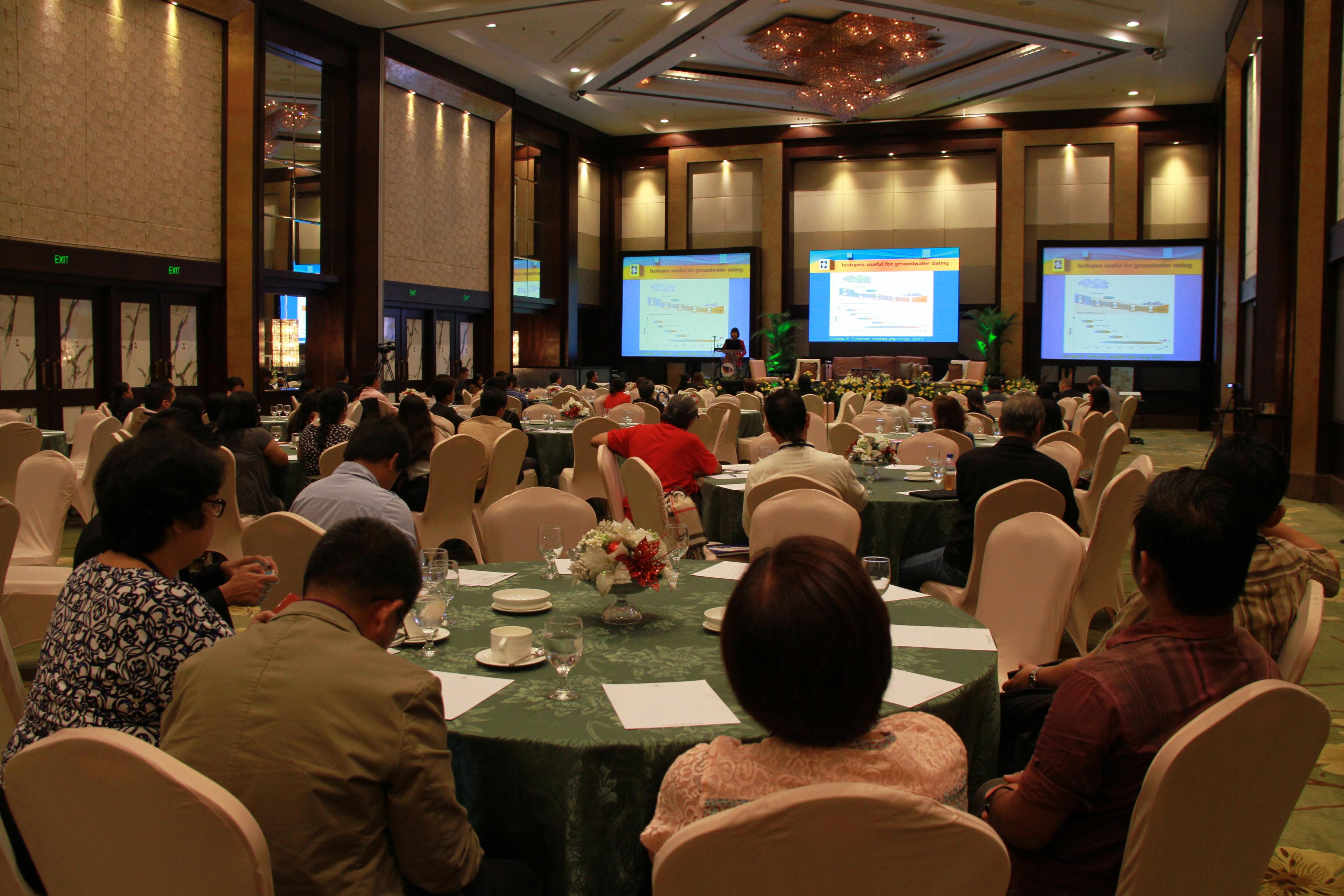
The 3rd PNC Technical Sessions at the ballroom of the Diamond Hotel in Manila
The Philippines Holds the 3rd Philippine Nuclear Congress
Continuing the stride for advancing nuclear applications for national development, the Philippines has recently held the Third Philippine Nuclear Congress (PNC) from December 7 to 9, 2015 at the Diamond Hotel in Manila.
With the theme, Meeting Challenges through Nuclear Science and Technology for Sustainable Growth, around five hundred representatives and experts from the agricultural, industrial, medical, government and academic sectors, including key officials from international organizations attended the PNC as they assessed the current state and contributions of nuclear technology in the Philippines and reviewed the steps to be taken to harness these technologies for inclusive and sustainable growth.
The 3rd PNC was organized by the Department of Science and Technology (DOST) and the Philippine Nuclear Research Institute (DOST-PNRI) along with several other partner agencies and scientific societies. The first and second Congresses were held twenty years apart, in 1976 and in 1996, respectively.
“Indeed, the Philippines has come a long way in harnessing nuclear science and technology for country development,” said DOST Secretary Mario Montejo in his inspirational message during the opening ceremonies on December 7.
“Though still not adequately known, the country has posted significant strides in harnessing the power of the atom in the fields of agriculture, health, industry and the environment, as well as in fostering nuclear safety, safeguards and security”
The Secretary mentioned several of these technologies developed in no small part through the efforts of PNRI and cooperating research agencies, such as the plant growth promoters developed from radiation-processed seaweed extracts, and precision farming methods using stable isotopes.
No less than Director General Yukiya Amano of the International Atomic Energy Agency (IAEA) graced the opening of the Congress as its guest of honor and keynote speaker. The Director General applauded the contribution of Filipino scientists, researchers and regulators in the IAEA’s various projects under the aim of Atoms for Peace and Development.
“More than three hundred Philippine nationals have served as international experts under our TC programme, sharing their knowledge and experience with other developing countries,” said Director General Amano.
Technical sessions and scientific exhibits were held during three days, where scientists, doctors, regulators, industrialists and government officials were met with a showcase of the latest nuclear and radiation technologies as well as the current issues that these applications may solve.
Another key aspect of the 3rd PNC is its renewed focus on the youth sector through the launching of the First Philippine Nuclear Youth Summit on the first day, where hundreds of students from high school and college levels as well as teachers, professors and young professionals were inspired by the experiences in the nuclear field as shared by Director General Amano himself along with other scientists and professionals.
This was followed by the National Level of the 2015 Philippine Nuclear Science Quiz, where the top secondary schools from across the DOST Regional Clusters competed in a contest of knowledge in the field of nuclear science and technology.
A healthy combination of international prestige, full inter-agency support, the presence and potential of the youth sector, and maximum participation by the audience made the 3rd PNC truly commendable, according to PNRI Director Dr. Alumanda Dela Rosa, who served as Co-Chairperson for the 3rd PNC.
During the closing ceremonies on the afternoon of December 9, the director thanked the participants and honored guests, and especially the men and women of PNRI for working hard in making the historic event possible. She also expressed her gratitude to the DOST, the IAEA and other partner agencies for their full support before and during the Congress.
Director Dela Rosa said that the resounding success of the three-day Congress will certainly prove to be a lesson and inspiration for future Congresses to come, which will hopefully be sooner and more frequent than the past ones.
“I hope it will not take us another twenty years to hold the 4th Philippine Nuclear Congress,” she said.
IAEA Director General Amano at the 3rd Philippine Nuclear Congress
- Details
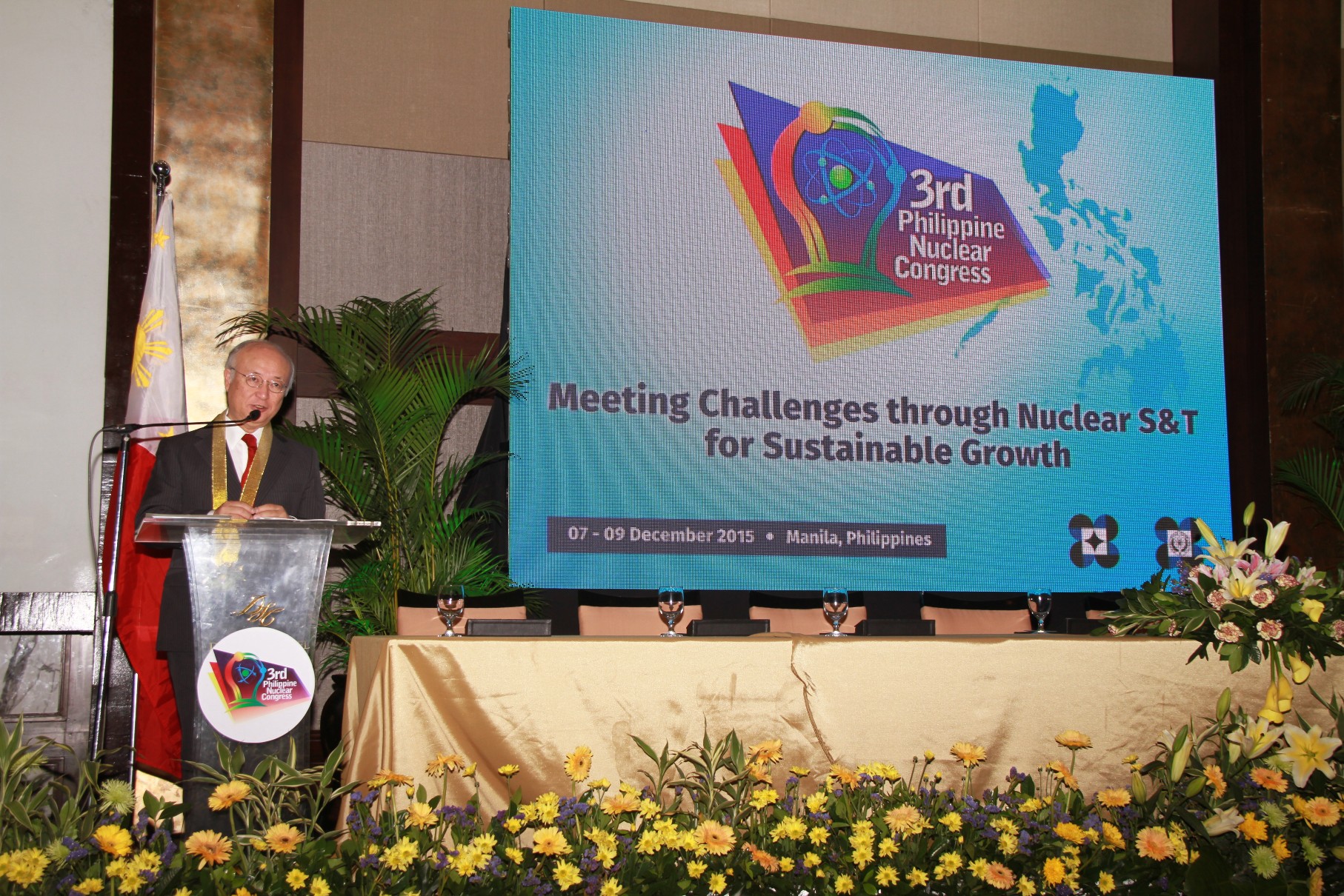
International Atomic Energy Agency Director General Yukiya Amano addresses the 3rd Philippine Nuclear Congress during its opening ceremonies on December 7 at the Diamond Hotel in Manila
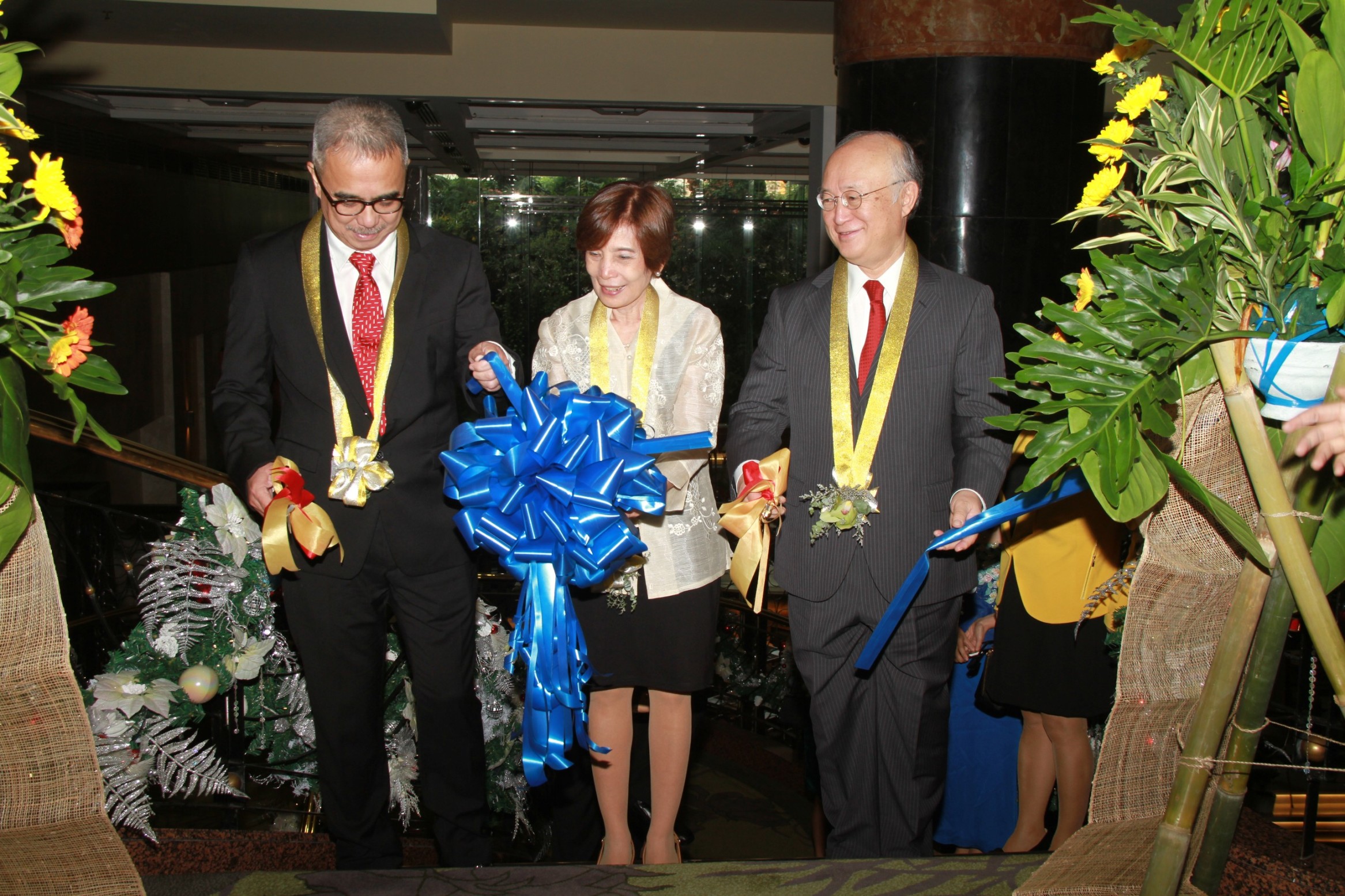
(From Left) Department of Science and Technology Secretary Mario Montejo, Philippine Nuclear Research Institute Director Dr. Alumanda Dela Rosa and Director General Amano officially opens the scientific exhibits of the 3rd Philippine Nuclear Congress
IAEA Director General Amano at the 3rd Philippine Nuclear Congress
Crowning the beginning of the Third Philippine Nuclear Congress this December 7, International Atomic Energy Agency Director General Yukiya Amano returned to the Philippines as the guest of honor at the opening of the historic multi-sectoral forum.
Director General Amano, who was met with a warm welcome and an impressive roster of nuclear facilities and laboratories during his previous visit to the Philippines last January, said during his keynote address that “it somehow seems appropriate that [his] last trip of the year should also be to Manila.”
He acknowledged the role of Filipino experts in the IAEA Technical Cooperation Programme, which is the primary avenue with which IAEA brings nuclear technology to its Member States. The Philippines has been a Member State of the IAEA since 1958, and has since been contributing to the United Nations agency through its expertise in nuclear R&D and regulatory functions.
“More than three hundred Philippine nationals have served as international experts under our TC programme, sharing their knowledge and experience with other developing countries.”
The Director General emphasized that the task of IAEA goes well beyond the nuclear weapons, as it continues to serve as a driving force in using nuclear science and technology in support of its Atoms for Peace and Development program. He also commended the efforts of the Philippines, particularly the PNRI, in developing nuclear and radiation applications that benefit not only the country, but also our fellow Member States in the Asia-Pacific Region and beyond.
“Our mandate is much broader than nuclear non-proliferation: it is to bring the benefits of nuclear science and technology to all humankind, while minimizing the risks.”
As for nuclear power in the Philippines, the Director General reiterated that while the IAEA does not intervene in a country’s decision to engage in a nuclear power program, the agency is always ready to assist countries that decide to use nuclear energy in a safe, secure and sustainable manner.
He highlighted the “striking overlap” between the various nuclear applications fostered by the IAEA and the United Nations’ seventeen Sustainable Development Goals, which aims to mitigate, if not solve, the issues of poverty, hunger, health, clean water, industry, energy and climate change.
Director General Amano was also present at the opening of the 1st Philippine Nuclear Youth Summit, where he advised the crowds of students and teachers that “nuclear science and technology is a very cool field to be in.”
“You will find it personally very rewarding and you will have an opportunity to contribute to the well-being and prosperity of your own country, and of the whole world.”
PNRI Plant Growth Promoters Increase Rice Yield Up to 60%
- Details

Plant Growth Promoters (PGPs) from carrageenan
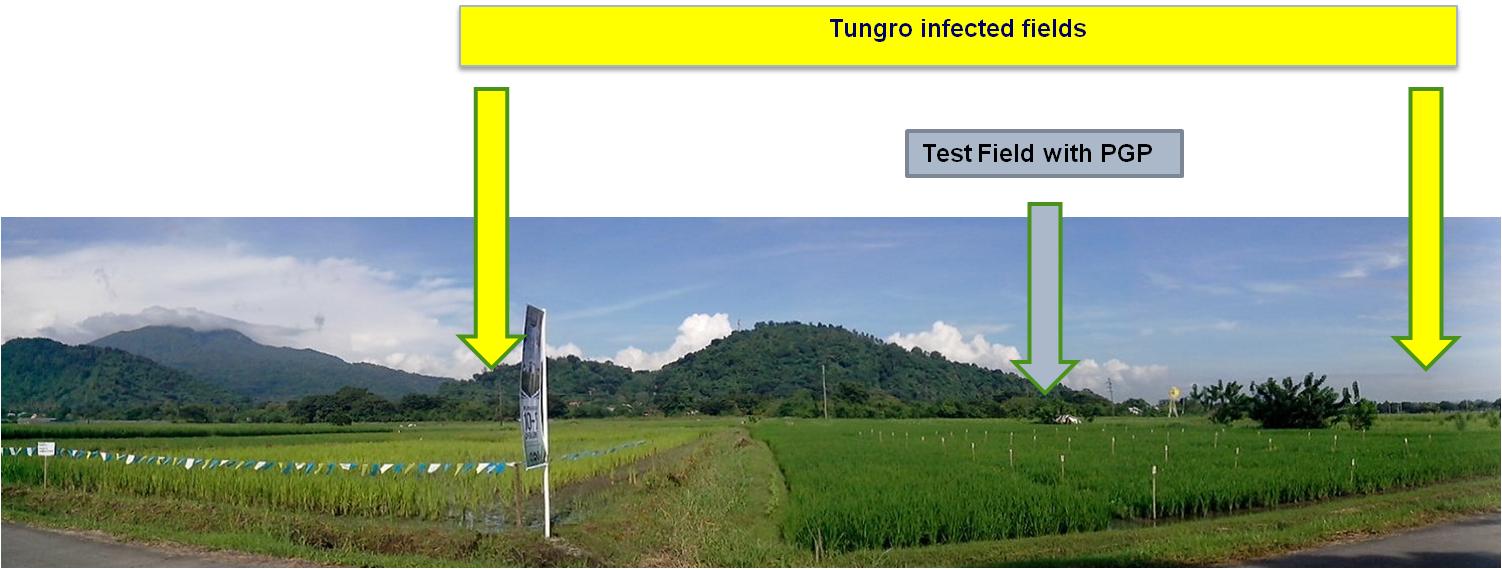
The rice tungro experiments conducted at the University of the Philippines Los Baños
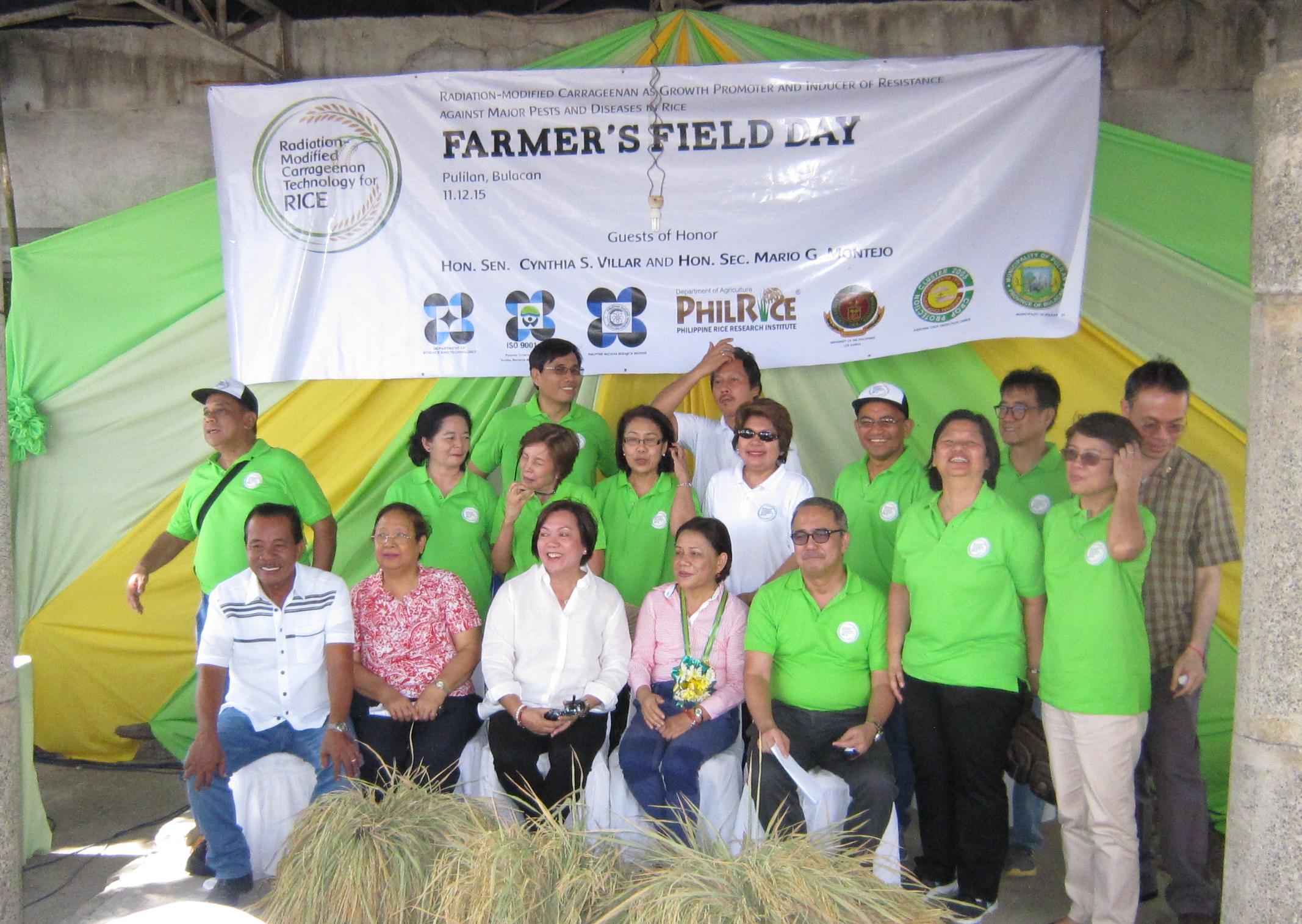
Senator Cynthia Villar (1st row, center), DOST Secretary Mario Montejo (1st row, 3rd from right), PNRI Director Dr. Alumanda Dela Rosa (2nd row, 3rd from left) and PNRI Chemistry Research Section Head Dr. Lucille Abad (1st row, 2nd from left) during the launching of the Plant Growth Promoters at the Farmer’s Field Day in Pulilan, Bulacan
PNRI Plant Growth Promoters Increase Rice Yield Up to 60%
Filipino farmers will soon be looking forward to a great harvest as radiation-modified Plant Growth Promoters (PGPs) can increase rice production to more than half the normal yield and protect them from infestation.
This breakthrough in Filipino agriculture was developed by scientists from the Department of Science and Technology – Philippine Nuclear Research Institute (DOST-PNRI) in cooperation with the National Crop Protection Center of the University of the Philippines – Los Baños (UPLB) and the Philippine Rice Research Institute (PHILRICE).
The scientists formulated these PGPs from radiation-processed natural polymers such as carrageenan, which is extracted from seaweed and processed into powder. Radiation-induced degradation of these polymers is used to develop natural bioactive agents. When degraded by radiation, polysaccharides yield oligosaccharides, or polymers with shorter chains. These oligosaccharides had been shown to have elicitor and plant-growth promoting properties.
For the past three years, the PGPs were being tested on rice farms in Nueva Ecija, Laguna and Bulacan. Results showed that with just around 3.2 liters per hectare of water mixed with the right proportion of PGPs, the crop yield of rice can be increased to around 60% compared to rice grown with normal farming practices. The field tests also demonstrated the improved resistance of rice applied with PGPs against the rice tungro bacilliform virus infestation as well as bacterial leaf blight.
Farmers can maximize the potential yield of their crops when using PGPs in conjunction with more efficient farming methods and proper timing. The PGPs are applied to the crops during three stages, the first during its early vegetative stage 12-14 days after transplanting, followed by a second application 16 to 22 days after the first stage (30-35 days after transplanting). The final batch of PGPs is best applied just before the flowering stage, 45-50 days after transplanting.
The PGPs for rice crops were officially launched on November 12 during the Farmer’s Field Day in Pulilan, Bulacan, with Senator Cynthia Villar and DOST Secretary Mario Montejo in attendance.
The Third Philippine Nuclear Congress
- Details

The Third Philippine Nuclear Congress
After almost two decades, the Department of Science and Technology – Philippine Nuclear Research Institute (DOST-PNRI) and its partner agencies will once again convene the Philippine Nuclear Congress (PNC) on December 7 to 9, 2015 in Manila, Philippines.
The PNC is a multi-sectoral forum for information exchange on the current status of nuclear science and technology in various fields. More than an assessment of the state and contributions of nuclear science and technology in national development, the congress aims to expand the participation of the different sectors to establish stronger linkages with collaborating institutions and individuals.


The 1976 Philippine Nuclear Congress held at the Philippine International Convention Center
The First Philippine Nuclear Congress (1976)
The country’s first nuclear congress was held in 1976, exactly thirty-nine years before this year’s congress. The first PNC adopted the theme “Partnerships for Progress Through Atomic Energy” and was held at the Philippine International Convention Center.
Experts and representatives from the fields of energy, food, environment, industry, medicine and education pooled their knowledge and experience to improve applications of nuclear science in their respective areas of expertise and, ultimately, to support the National Atomic Energy Plan that paved the way for the construction of the Bataan Nuclear Power Plant. The Congress was organized by the Philippine Atomic Energy Commission (PAEC) under the Office of the President, which is now the Philippine Nuclear Research Institute (PNRI) under the Department of Science and Technology.

The Second Philippine Nuclear Congress in 1996 with IAEA Director General Hans Blix (center) as guest speaker
The Second Philippine Nuclear Congress (1996)
Twenty years later, the second PNC was convened from December 10-12, 1996. This coincided with the 100th anniversary of the discovery of radioactivity by Henri Becquerel.
With the theme “Challenges of Nuclear Technology for the 21st Century”, the second PNC sought to respond to global issues through nuclear science and technology as applied in various sectors, especially to prepare for the next millennium. The Congress was graced with the presence of Dr. Hans Blix, the then-Director General of the International Atomic Energy Agency (IAEA).
Many nuclear and radiation applications have already been developed since the previous Congress, which came in time to meet the greater demands for food, water and energy, as well as worldwide problems in health, and environmental protection. Back then, the Philippines was also reconsidering nuclear power for the country’s energy mix, as President Fidel Ramos created a Nuclear Power Steering Committee for the implementation of a comprehensive nuclear program.
The Upcoming Third Philippine Nuclear Congress (2015)
Today, the Philippines has come a long way in harnessing the power of the atom in the fields of agriculture, health, industry and environment, as well as nuclear safety, safeguards and security. These achievements and more will be showcased in the third PNC, which will be held on December 7-9, 2015. With the theme, "Meeting Challenges through Nuclear Science and Technology for Sustainable Growth", the Third Philippine Nuclear Congress (PNC) will once again provide a valuable forum for reviewing the global, regional and national scenarios in nuclear science and technology applications for technological development and inclusive growth.

IAEA Director General Yukiya Amano (right), who visited the Philippines in January 2015, will be the keynote speaker for the 3rd Philippine Nuclear Congress on December 7-9, 2015
For the third PNC, the current IAEA Director General Yukiya Amano was invited to be the keynote speaker. Director General Amano previously visited the Philippines in January 2015 as part of his tour of the IAEA Member States in Southeast Asia. He applauded the country’s efforts not only in advancing the uses of nuclear science and technology but also in contributing to the development of our neighboring countries in the nuclear field.
From December 7 to 9, national and international experts in the nuclear field will present and discuss applications in food and agriculture; health and medicine; industry; and the environment; as well as current developments in nuclear safety, security and safeguards. Exhibits by scientific societies, government agencies, and members of the academic and research sectors will also be featured during the Congress.
First Philippine Nuclear Youth Summit and 2015 Philippine Nuclear Science Quiz
The upcoming Congress will witness the launching of the first Philippine Nuclear Youth Summit on the first day of the PNC, in recognition of the youth’s great potential as well as their growing interest in nuclear and radiation technologies. This will afford students from colleges and secondary schools across the country a voice in the future of nuclear science and education in the country.
The Congress will also host the 2015 Philippine Nuclear Science Quiz at the National Level, where the qualifying contenders from the various DOST Regional Clusters will compete for the top spots.
With representatives from the agricultural, industrial, medical, government and academic sectors gathering together to assess the state and contributions of nuclear science and technology in national development, the Third Philippine Nuclear Congress will be one of the significant milestones in the history of nuclear science and technology in the Philippines.












































